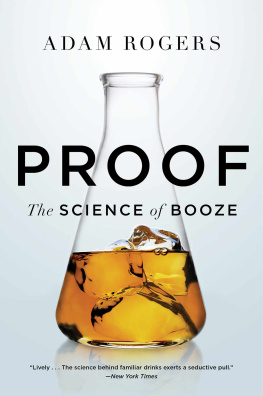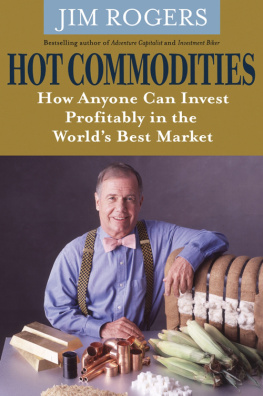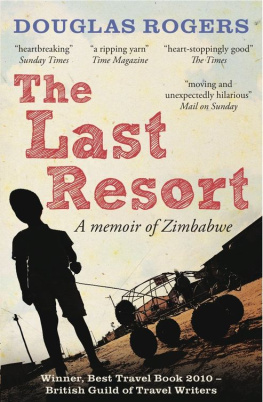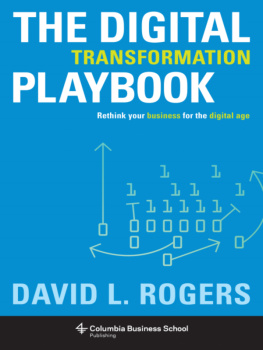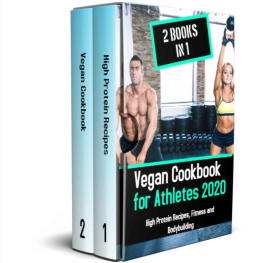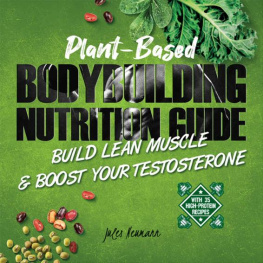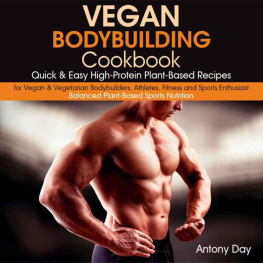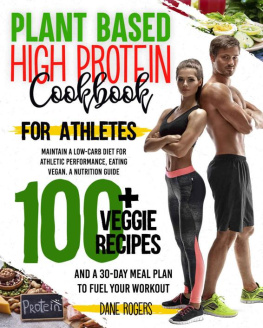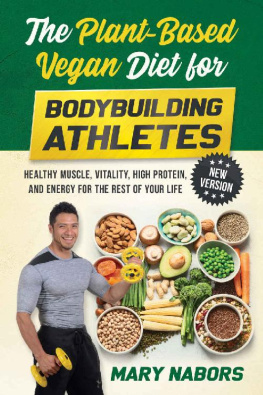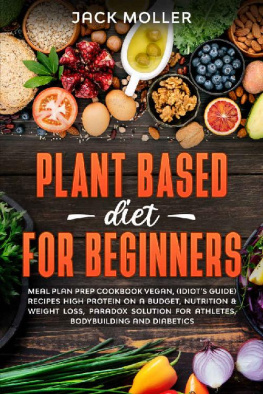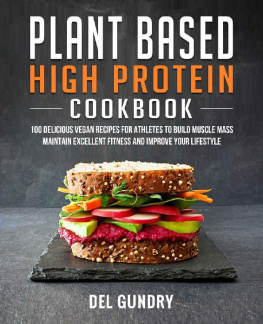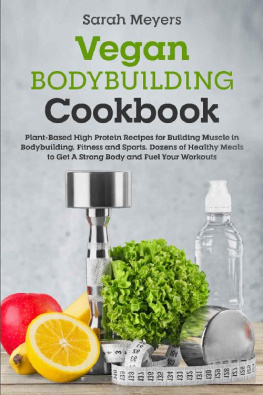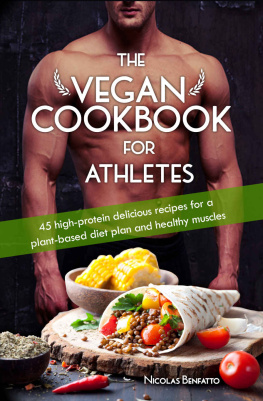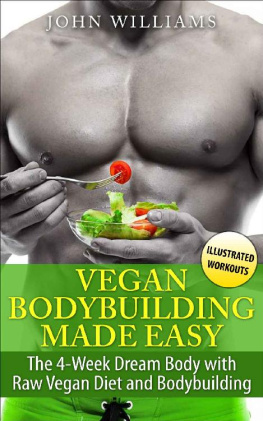DANE ROGERS
PLANT-BASED FOR BODYBUILDING COOKBOOK:
Vegan Recipes for Successful Bodybuilders. Muscle Growth with Low-Carb and High-Protein Food for a Muscular and Powerlifter Body + 30 Days Meal Plan.
Copyright 2020 - All rights reserved.
The content contained within this book may not be reproduced, duplicated or transmitted without direct written permission from the author or the publisher.
Under no circumstances will any blame or legal responsibility be held against the publisher, or author, for any damages, reparation, or monetary loss due to the information contained within this book. Either directly or indirectly.
Legal Notice:
This book is copyright protected. This book is only for personal use. You cannot amend, distribute, sell, use, quote or paraphrase any part, or the content within this book, without the consent of the author or publisher.
Disclaimer Notice:
Please note the information contained within this document is for educational and entertainment purposes only. All effort has been executed to present accurate, up to date, and reliable, complete information. No warranties of any kind are declared or implied. Readers acknowledge that the author is not engaging in the rendering of legal, financial, medical or professional advice. The content within this book has been derived from various sources. Please consult a licensed professional before attempting any techniques outlined in this book.
By reading this document, the reader agrees that under no circumstances is the author responsible for any losses, direct or indirect, which are incurred as a result of the use of information contained within this document, including, but not limited to, errors, omissions, or inaccuracies.
TABLE OF CONTENTS
Introduction
T he world is changing and so is our diet. Food pyramids, which are a kind of visual guide that explain which foods we should eat and in what quantities reflect the times we live in. If you compare a Food Pyramid of thirty years ago to today, you will see that carbohydrates were recommended as a staple of a persons diet, e.g. bread, potato, pasta, and rice.
Today, these foods have moved to a different position. What has changed in the meantime is our knowledge about what foods are necessary for optimal health. Today, the most essential foods are considered to be leafy greens, legumes, and nuts & seeds.
Plant-based diets are gaining in popularity and even diets based on meat, such as Paleo, insist that one should eat plenty of fruits and vegetables. This shouldn't be surprising since a lot of new evidence has emerged about the health benefits of a vegetarian diet.
This is why when you switch to a plant-based diet you are not only able to maintain good health; you also easily prevent the onset or reverse the course of a disease.
Choosing the right foods and meals can be challenging, but this book will make it easy for you.
Chapter 1:
What is a Plant-Based Diet?
Y ou may be intrigued about what plant-based eating is all about. Most people have been hearing about this and are wondering how this is different from veganism or vegetarianism? Most often, you are confused about how beneficial plant-based eating would be for your health. This book will help you get answers to these questions and show you the road map towards a plant-based way of living.
It has been seen from some research carried out by experts and dieticians that the biggest obstacle that most people face when making up their minds on a plant-based diet is the issues of mental resistance. We believe that it will be too difficult or expensive to maintain, while others might think that this is another new diet routine that will not yield the desired results and last for long.
But it is important to understand that a plant-based diet is no fad or a diet style that you get involved in just to lose weight. Plant-based dieting is a great way to keep fit while maintaining a healthy living with plants as your energy. These plant-based diets help you stay strong at any stage of your life, prevent diseases, raise healthy and strong plant-based children, and keep strong while pregnant.
How can we simplify this explanation so that even a layman on the street can easily grasp what this dieting routine is all about?
The plant-based diet aim is to eat more plants this may sound simple enough, but it might not be as simple as you may think it is.
Since most people are more comfortable with their current way of dieting and are unsure of what plants to eat and when to eat it, it often becomes a daunting task for the non-initiated.
Plant-based dieting is simply eating more plants. Whole plant-based foods can also be seen as unprocessed foods that normally come from the earth.
When discussing plant-based diets, it is normal to eat some minimally processed foods with whole foods plant-based diets such as whole wheat pasta, whole bread, tofu, and non-dairy milk and some seed butter and nuts. These entire food sources are okay as long as they are processed.
This book aims to ensure that you eat mostly and exclusively plant-based food at all times, but that might require a slight transitional phase that involves one eating more of the natural products provided us by mother earth.
Chapter 2:
What is a Vegan Bodybuilding Diet?
F or aesthetic reasons, bodybuilders conduct intensive strength training and strive to build muscle tissue. Nutrition plays an important role in the process of building muscle. For optimal muscle growth, it is generally believed that protein intake is fairly high at around 0.7 to 1.0 grams per pound per day (1.6 to 2.2 grams/kg). An excess of 10 to 20% of calories can also help build muscle, especially for those new to training. Traditional bodybuilding diets contain many animal foods due to their high protein and calorie content.
A vegan bodybuilding diet contains no animal products and must contain more protein than a conventional vegan diet. This is a challenge for bodybuilders since vegetable proteins tend to be of lower quality than animal proteins and can affect muscle building. Therefore, careful planning is required to ensure adequate intake of protein, calories, and some micronutrients that may not be included in the vegan diet. Vegan bodybuilding diets change in different phases of a bodybuilder's life, e.g., in the off-season or when preparing for competitions where body fat is often lost.
Some important points
1) Many vegans have difficulty building muscle because it is difficult to eat enough high-quality protein. This can be solved by eating more suitable plant protein.
2) Vegans must also have sufficient omega-3 fatty acids, vitamin B12, vitamin D, and other nutrients from a variety of foods and nutritional supplements.
3) The most effective way to make vegan bodybuilding work is to create a vegan bodybuilding diet plan. Read on to learn how!
How to implement the diet
Implementing a vegan diet may seem very easy, but ensuring complete nutrition requires considerable planning. Vegan bodybuilding diets include several staple foods on which much of the diet is based. Many vegan recipes require some products. To start a vegan bodybuilding diet, it is beneficial to plan a 5-7-day meal to ensure all the ingredients. If you are moving from a traditional diet, it may be helpful to slowly add more vegan foods to your normal diet before you switch completely.


